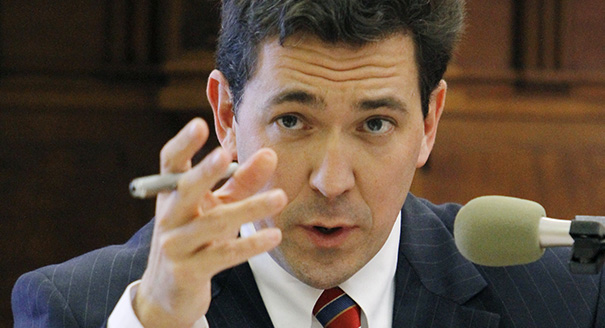[protected-iframe id=”b798b41c5125e76344be8667e566736c-46934866-60066902″ info=”//www.spreaker.com/embed/player/standard?autoplay=false&episode_id=4680837″ frameborder=”0″ scrolling=”no”]
Videos by Rare
I wanted Mississippi Republican senate candidate Chris McDaniel to defeat 36-year incumbent Senator Thad Cochran in last week’s GOP primary. McDaniel represented a new breed of constitutional conservative who continue to upset the status quo while Cochran is exactly the kind of Republican you can count on to keep Washington exactly the way it is.
Because of Cochran’s GOP establishment credentials, most thought McDaniel was going to defeat Cochran.
But he didn’t. In fact, it was Cochran’s pitch that he was just another big government Republican that helped him win.
Cochran went after Democratic voters, particularly African-Americans, advertising his ability to bring home pork to Mississippi. He also smeared McDaniel as a racist. Many Republicans considered it a dirty trick—that Cochran actively lobbied registered Democrats to essentially decide a Republican primary.
Black conservative author Star Parker had another take, writing in her syndicated column:
McDaniel knew exactly what to expect. The Cochran campaign told him. Yet he remained a spectator through it all. His counterstrategy was no counterstrategy — just continue what he was already doing: appealing just to Mississippi’s conservative white electorate.
Parker notes that as a state senator, McDaniel knew that not all African-Americans in Mississippi are liberal. She believes he could have potentially appealed to enough black conservatives to win what was a very close election.
Perhaps this is true. But McDaniel could have also appealed to many independent and Democratic black voters as well.
If Cochran’s message was ‘Here’s what government can do for you’ McDaniel could’ve reminded black voters what government was doing to them.
Senator Rand Paul currently has about a 29 percent approval rating from African-Americans in his home state of Kentucky, something many attribute to his constant minority outreach. Paul has actively worked to reform, or end, federal mandatory minimum sentencing laws that have kept countless black men and women behind bars for decades for non-violent drug related crimes.
Some have gone so far as to call mandatory minimum sentencing the “new Jim Crow.”
Paul has also been an advocate for restoring the voting rights of ex-felons, something that resonates in black communities where the war on drugs has often been a disproportionate war on African-Americans.
Senator Mike Lee and other libertarian-leaning Republicans, who generally supported McDaniel, have also helped promote legislation that would undo some of the adverse affects the drug war has had black communities.
These issues aren’t the only ones of concern to black Americans. But neither are the pork barrel promises promoted by Cochran. McDaniel could’ve appealed to black conservatives, as Parker notes, but he could have also pitched anti-drug war ideas to the black community in the same way Rand Paul has done with considerable success.
If Rand Paul has 29 percent of black Kentuckians support, how much African-American support would McDaniel have needed to win an election that was only lost by two measly points?
Black Americans will not vote for Republicans if they have the perception that Republicans don’t like them. Thad Cochran went out of his way to promote that this was the case with McDaniel. Chris McDaniel could’ve done a lot more to show his fellow black Mississippians that it simply wasn’t true.
But he didn’t try.
Perhaps the greatest irony is that it would be easy to envision a U.S. Senator Chris McDaniel voting alongside Rand Paul and Mike Lee in dismantling aspects of the war on drugs that continue to oppress black Americans. Thad Cochran likely would never lift a finger to change any of it.
But no one told black voters in Mississippi this.
Parker writes, “There are plenty of black conservatives who understand that big government politicians — Democrats or Republicans — hurt their communities.”
She added, “They just need Republican candidates to recognize they exist.”
Disclosure: I co-authored Senator Rand Paul’s 2011 book The Tea Party Goes to Washington.



